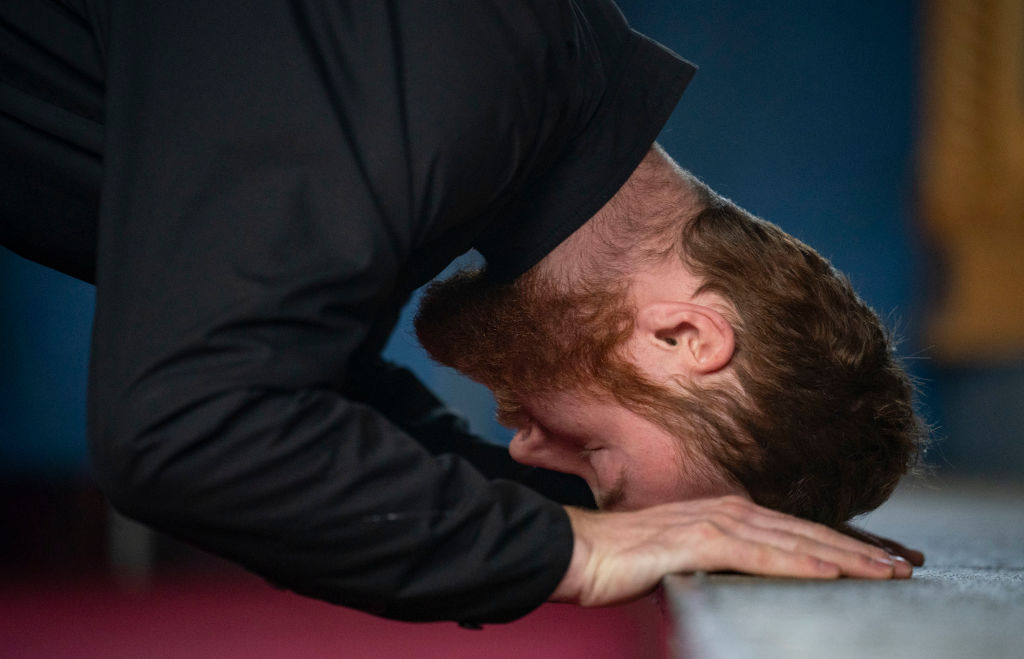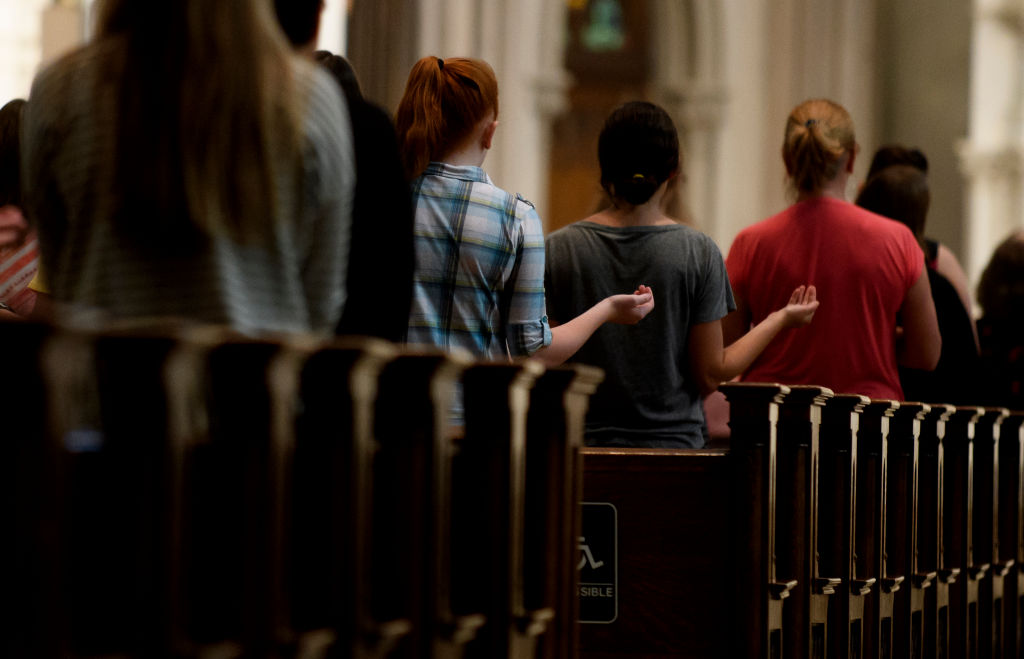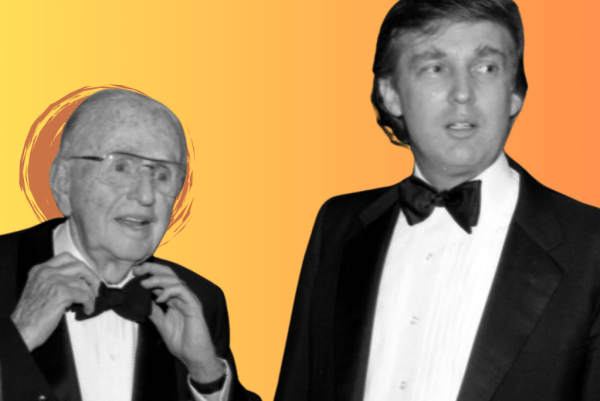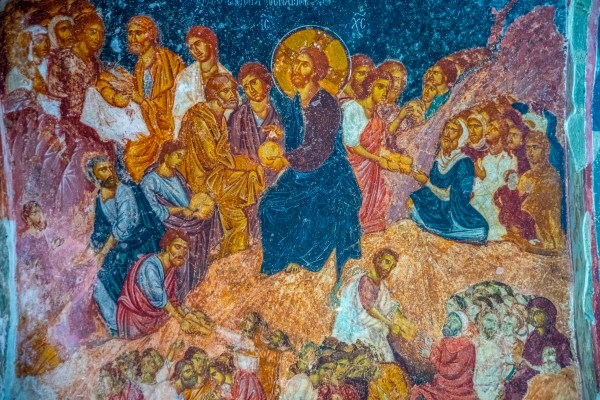Happy Sunday. A handful of stories in recent years have tried to track a swath of young men converting to Eastern Orthodox churches—sometimes implying nefarious reasons. Observers and journalists like my friend Terry Mattingly have urged caution in interpreting such reports, but such stories continue to pop up.
Today Gregory Jensen, a Wisconsin-based Orthodox priest, poses a few questions both for those trying to make sense of those stories but also for Orthodox believers themselves.
Gregory Jensen: What to Make of More Men Becoming Orthodox

The media have it wrong. OK, maybe not just the media. I’m not sure if Orthodox Christians and the broader Christian community have thought through the implications of the reported uptick in young people (primarily men) becoming Orthodox. There are three questions we need to ask to understand what is—and more importantly—is not happening in the life of the Orthodox Church in the U.S.
First, is there actually a growing trend of young men looking to become Orthodox Christians? Second, is it correct to describe Eastern Orthodox Christianity as “masculine,” especially in contrast to “feminine” Western Christian traditions? Third, and most importantly for me as an Orthodox priest, what does the embrace of these popular narratives say about the Orthodox Church and our relationship to the wider American culture?
The gospel doesn’t need to be a trend.
Whatever else might be true about the reported uptick in men converting to Orthodoxy, we simply don’t have enough data to support the idea that this is a mass movement. For the foreseeable future, the Orthodox Church in the U.S. will be primarily a community of immigrants and their children. And while some in the church might push against the notion of an “ethnic” Orthodox Church, it is precisely because of our “otherness” that people seek us out.
Trevin Wax at The Gospel Coalition highlights this. “New converts drawn to the strangeness or otherworldliness of Orthodox worship are also encountering, in Orthodox communities, the ‘foreignness’ of other peoples transplanted into the American context.” I agree with him that it is unclear whether this latest wave of conversions will result in large or even marginal growth for the church in America.
But this sense of “foreignness” or, to use a contemporary term, “otherness” has long been a characteristic of Orthodox worship. When Grand Volodymyr of Kyiv, a prince born in the 10th century, sent his emissaries to examine the great religions of his time, they attended the Divine Liturgy at Hagia Sophia in Constantinople and reported that “we went into the Greek lands, and we were led into a place where they serve their God, and we did not know where we were, on heaven or on earth; and do not know how to tell about this. All we know is that God lives there with people and their service is better than in any other country. We cannot forget that beauty since each person, if he eats something sweet, will not take something bitter afterwards; so we cannot remain any more in paganism.” Elements of our worship today still give modern visitors to an Orthodox congregation the sense of entering a different world: our often small congregations, clergy in ornate vestments instead of business suits or skinny jeans, icons instead of white walls, chants sung from memory rather than praise music with lyrics on a screen.
The good news for the Orthodox Church is that there seems to be a renewed interest by young people in more liturgically traditional forms of Roman Catholicism and Anglicanism. “Young people,” Wax writes, “are hungry for vibrant, immersive faith, not a watered-down version of Christianity that makes few demands.” As a chaplain at the University of Wisconsin-Madison, I see this in the young people I serve. Here in the secular, uber-progressive so-called “People’s Republic of Madison,” young people—moslty men but also young women—are attracted to the liturgical and ascetical spirituality of the Orthodox Church. Nevertheless, there is a need for sobriety in how we think about things.
Perhaps most noticeably, Orthodox parishes often don’t see much interest from Orthodox young people. Those raised in the church are often indifferent to her teachings and practices while it is those from outside the church who are most interested. I’ve received young people from Catholic, mainline Protestant and evangelical backgrounds. Many have also come from non-Christian traditions; Jews, Hindus, and secular Americans have all come seeking Jesus Christ. But I haven’t seen the same enthusiasm in young people raised Orthodox. Making new Christians is good, but that goodness is tempered when cradle Christians are leaving.
This is not to say that everything with our young people is negative. Far from it. Two-thirds of Orthodox Christians are between 18 and 49, compared to half of all Catholics and Evangelical Christians. Our members are also younger than those in historic black churches (56 percent) and Mainline Protestants (45 percent). But Orthodoxy in America is still, as Wax points out, “a tiny tradition in the States, smaller even than the liberal United Church of Christ.” Under these circumstances, he adds, “percentage increases can seem dramatic when the baseline is small.”
A manly church for manly men?
When I started as a priest some 30 years ago, most of the people I received into the church were attracted by the beauty of the Divine Liturgy and our theology. While this is still the case today, I am also seeing more young men who are attracted to the stability, rigor, and discipline that characterize Orthodox spirituality. While fasting, for example, is not unknown in Catholicism and other forms of Christianity, neither does it have the prominence it does in Eastern Orthodoxy. During Lent, for example, we abstain from meat, dairy, wine, and olive oil.
At the same time, I would resist describing us as more masculine, as some of the characterizations in recent media stories implies. Such characterizations often overlook the fact that during the persecutions of the Soviet era, it was women—and primarily grandmothers—who were active in the Orthodox Church and who kept the faith alive (if often on life support). It was Baba who came to Liturgy, lit candles, prayed for her children, and saw to it her grandchildren were baptized.
While men and women are no doubt different physiologically, there is no such thing in Orthodoxy as “men’s” spirituality as distinct (or what is worse, opposed!) to “women’s” spirituality. Men and women, young and old, are all asked to pray and read Scripture daily, fast, give to the poor, work with their hands, confess their sins, join with the church in the worship of God, and receive Holy Communion. A godly Orthodox man and a godly Orthodox woman will live similar spiritual lives.
In a mirror dimly.
Fidelity to Christ and the tradition of the church matters not only personally and pastorally but also dogmatically and morally. Either personally or through friends whose opinions in these matters I respect without reservation, I know most of the priests mentioned in the New York Post and the Telegraph. There is no question in my mind that these men love Christ and that their pastoral fidelity and sacrifices for the gospel far exceed mine. I respect them as I do all those doing the hard work of fulfilling Jesus’ command to “make disciples of all the nations, baptizing them in the name of the Father and of the Son and of the Holy Spirit, teaching them to observe all things that I have commanded you” (see Matthew 28:19-20).
There is no question that the stories about young people becoming Orthodox are inspiring. At the same time, it is not wrong to be cautious. Writing in the fourth century, St. Cyril of Jerusalem was aware that people’s motives for joining themselves to Christ and the church can be impure or at least mixed. Maybe “a man is wishing to pay court to a woman, and came hither on that account. The remark applies in like manner to women also in their turn.” Then there is the slave who “perhaps wishes to please his master, and a friend his friend.” Much more recently, Sarah Riccardi-Swartz observes in Between Heaven and Russia: Religious Conversion and Political Apostasy in Appalachia that at least some converts to the church are motivated by “nostalgic apocalypticism,” or the hope to find in Orthodox Christianity “a return to a so-called traditional Christian society” that will protect them from what they fear is an “impending social destruction because of increased liberalism” in American society.
Riccardi-Swartz’s concern is part of a larger, dare I say, “ecumenical” trend that scholar Ryan Burge highlights. “People are picking their religion based on their politics, not their politics based on their religion,” he wrote two years ago. Like in St. Cyril’s time, mixed motives for conversion are still a pastoral challenge facing the church.
Closer to our own time, the late Orthodox theologian Father Alexander Schmemann addressed the challenges the Orthodox Church, and all Christian communities, face. We must avoid, he writes, both the temptation of “secularism—the progressive and rapid alienation of our culture, of its very foundations, from the Christian experience” as well as a “Manichean rejection of the world, for an escape into a disincarnate and dualistic ‘spirituality.’” Both “attitudes distort … the wholeness, the catholicity of the genuine Orthodox tradition which has always affirmed both the goodness of the world for whose life God has given his only-begotten Son, and the wickedness in which the world lies, which has always proclaimed and keeps proclaiming every Sunday that ‘by the Cross joy has entered the world,’ yet tells those who believe in Christ that they ‘are dead and their life is hid with Christ in God’” (Colossians 3: 3).
But like secularism, nostalgic apocalypticism and authoritarian politics all allow Christians to avoid what Schmemann calls “our real question: … how can we ‘hold together’—in faith, in life, in action-these seemingly contradictory affirmations of the Church, how can we overcome the temptation to opt for and to ‘absolutize’ one of them, falling thus into the wrong choices or ‘heresies’ that have so often plagued Christianity in the past?”
How are we to avoid the extremes Father Schmemann warns us about? Hovorun is helpful when he says that with “the advance of secularisation” the church has experienced a jarring transition “from engulfing the entire world,” to “suddenly ... smaller than the world and surrounded by it. This world no longer recognised itself as an intrinsic part of the Church” and has often “rejected the Church altogether.” Being rejected by the world should not come as a surprise to the Christian; Jesus after all promises us that this will happen (John 15:18-25). The question is how to respond.
“Sometimes the Church responded by rejecting the world altogether,” Horvorun writes. When it does, however, it allows the world to set the agenda and fails to realize that she has made “the same gestures that the secularised world made toward her, with the only difference that her right hand in the mirror was left.” Better, I think, for Christians and those of good will to see the various social pathologies around us as an opportunity for self-understanding in light of the gospel or natural law As Hovorun writes, “When the Church acknowledges the world (without necessarily accepting it), even if the latter seems to be hostile, this helps her to see and understand herself significantly better.”
The enduring desire for holiness.
For Orthodox spirituality, the ascetical disciplines of prayer, fasting, almsgiving, and manual labor build on the grace of the sacraments to slowly reform the desire of the human heart. Like St. Paul, I am called to “discipline my body and bring it into subjection, lest, when I have preached to others, I myself should become disqualified” (1 Corinthians 9:27). A life of spiritual discipline is not limited to me as a priest but is common to all Orthodox Christians.
Whatever the motivation that brings people to Christ and his church, this is only the starting point of a life of gradual transformation by grace and the exercise of our own freedom. However poorly or well we begin, holiness, and participation in the divine nature (2 Peter 1:4), remain the goal. And spiritual discipline? This matters because, alongside the desire for holiness, evidence also abounds that the temptations that the fourth-century monk Evagrius describes as the Eight Deadly Thoughts: Gluttony, Lust, Avarice, Sadness, Anger, Accidie (sloth), Vainglory, and Pride, are still with us.
Whatever one makes of the new converts to the Orthodox Church drawing so much attention, the good news is that points to the fact that desire for holiness in a robust sense is very much alive in the hearts of Americans young and old, Orthodox, Catholic, Protestant; Christian and non-Christian; religious believers, agnostics, atheists, and nones.
Victoria Holmes: Catholicism’s Answer to Gen Z

Victoria Holmes is usually behind the camera (or behind the podcast recording software) for us, but today she’s reported a story for our site examining why young people are coming to the Catholic Church—or in some cases are returning.
The well-documented rise of the nones—those who claim no religious belief or affiliation—has fueled theories that politics is taking the place of faith. Even so, some in Generation Z are turning toward the Catholic Church for the tradition and community often lacking in the modern institutions. Harvard University’s 2023 Cooperative Election Study shows a significant increase in just one year in the percentage of millennials and Gen Zers identifying as Catholic—from 6 to 20 percent for millennials and from 15 to 21 percent for Gen Zers from 2022 to 2023. This unexpected shift suggests that, for some young people, the Catholic Church is filling a void left by modern society.
“I think for those who are already politically on the right, and already have anti-modern disposition, Catholicism can represent something that’s like the beacon of Western civilization, or like that which has stood athwart wokeism all these years, or a living remnant of a more beautiful past,” says Kayla Bartsch, a Yale alumna who converted from Lutheranism to Catholicism in 2021. Bartsch grew up in a conservative family and says the issue of abortion made her more politically minded at a young age. She started going to Mass weekly during her time at Yale, which differentiated her from most of her peers. In light of questions they had for her, she now thinks her classmates were experiencing a vacuum of goodness and truth. The beauty of the faith and tradition drew their curiosity, even if they didn’t agree with Catholic teachings, she now says.
Victoria also spoke with Father Simon Teller, a campus minister at Providence College who are finding the church through campus outreaches like his.
“The majority are people who hadn’t really thought about their faith until coming here and then maybe seeing friends who go to Mass or meeting with some of the friars, or going to class and hearing their professors talk about religion in a way that they’d never experienced before,” he said. “That often plants a seed making them realize they’ve never taken religion seriously before. And I think a big motive for people is they have an intuition that there’s something real about Catholicism. There’s something real about their faith that they want to be connected to.”
More Sunday Reads
- There was no shortage of takes on the message Episcopal Bishop Mariann Budde’s pointed message to President Donald Trump Tuesday during the inaugural prayer service at the Washington National Cathedral in which she exhorted him to “have mercy upon the people in our country who are scared now,” then specifically mentioned immigrants and LGBT children. Two writers at The Atlantic offered two different and interesting perspectives. Elizabeth Bruenig cast it as a message staying true to the Chritian principle of mercy, which any leader needs to heed. “Christian priests and pastors have thus exhorted leaders to mercy for many centuries—in fact, this style of communication with power could constitute its own genre,” she wrote. “The Christian faith is careful to exhort the powerful to mercy because mercy is so opposed to the exercise of power; in fact, mercy requires that a leader restrain themselves from the harshest of decrees and punishments, and the Christian tradition proudly recommends as much. For having mercy protects not only mercy’s recipients, but also the merciful themselves. What Trump despises in Budde’s plea for mercy may be the key to saving his own soul—if only he would listen.” But her colleague Caitlin Flanagan had a wholly different reaction: that Budde’s sermon was the perfect encapsulation of the difference between sincere believers and the “let’s just get along” impulse of many in more theologically liberal traditions. “It was dry, high-minded, and Christ-light, and it built on a theme of ‘unity’ in which all people drop their political differences and embrace a generalized, feel-good, Esperanto-like uni-faith, with everyone directing their prayers to Whom It May Concern.” Flanagan continued: “The high priestess wanted to reveal her goodness, her moral purity, her inclusive and diversity-forward politics. She wanted a gold star, and in many quarters she got one. A headline in The New Republic read ‘Trump Seethes as Bishop Calls Him Out in Heartfelt Plea.’ Trump issued a demand that the bishop apologize. But in the church he had looked only bored, as though his mind was on other things. Maybe he was seething. Or maybe he was thinking, That’s why I won.”
- In Senegal for BBC, Rukia Bulle profiles a small offshoot of Islam, known as the Baye Fall, who have an unorthodox view of work. “The Baye Fall, a subgroup of Senegal’s large Mouride brotherhood, are unlike any other Muslim group. They make up a tiny fraction of the 17 million population in Senegal, a mainly Muslim country in West Africa. But their striking appearance makes them stand out, and their unorthodox practices are believed by some to stray too far from Islamic norms. For Baye Fall devotees faith is expressed through hard work and community service. In their eyes, heaven is not merely a destination but a reward for those who toil. They are often misunderstood by other Muslims — and there is also a misconception in the West that some drink alcohol and smoke marijuana, which is not part of their ethos. ‘The philosophy of the Baye Fall community is focused on work. It’s a mystical kind of working, where labour itself becomes devotion to God,’ Maam Samba, a leader of a Baye Fall group in Mbacke Kadior, tells the BBC.’”
A Good Word
This year marks the 500th anniversary of William Tyndale’s initial publications of an English version of the New Testament. Just 11 years later, the work would claim Tyndale’s life as he was burned at the stake. In Law & Liberty, scholar Richard Gunderman writes about the importance of the translation not just for obvious religious reasons but for the founding of the United States more than two centuries later. “Tyndale’s translation and the theology behind it had a profound effect on the rule of law and the promotion of liberty. Tyndale evinced a deep respect for the dignity and judgment of ordinary people, we who would one day become the citizens of nations such as the United States. Not only could we be trusted to interpret scripture for ourselves, he argued, but we had a religious duty to do so. The word of God itself took precedence over the pronouncements and policies of prelates, a viewpoint that undermines arbitrary authority and lays the groundwork for the primacy of written constitutions. What mattered most were not arcane and esoteric doctrines but words that could be heard and remembered by even illiterate people. Tyndale’s efforts to sift and purify the text in this way are manifest in the remarkable simplicity of his language, which contains a striking proportion of short sentences and monosyllabic words. The Bible was not meant, he held, to reside in some remote and ornate sanctum sanctorum but in the homes and hands and on the lips of every person, just as schoolchildren today might memorize the Declaration of Independence or the Gettysburg Address. Like Luther’s German version, Tyndale’s English translation sowed the seeds of literacy throughout the land. If what matters most is each person’s relationship to God, and if that relationship is grounded in scripture, then each person needs direct access to the Bible. Initially, for most, this meant having the text read to them in their own tongue, but it rapidly progressed in less than a century to a society that produced both a Shakespeare and a thriving market for his works. Words define us and give our lives meaning, and no one did more than Tyndale to provide the words to English speakers.”






Please note that we at The Dispatch hold ourselves, our work, and our commenters to a higher standard than other places on the internet. We welcome comments that foster genuine debate or discussion—including comments critical of us or our work—but responses that include ad hominem attacks on fellow Dispatch members or are intended to stoke fear and anger may be moderated.
With your membership, you only have the ability to comment on The Morning Dispatch articles. Consider upgrading to join the conversation everywhere.